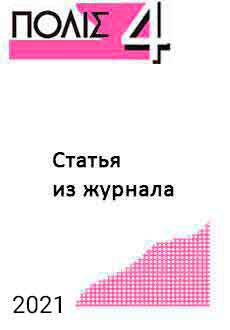Online shop of "Polis. Political Studies" Journal
We in the world, the world in us
Mchedlova M.M., Kazarinova D.B. COVID-19 Pandemic Challenge and Religion: Ontology vs Politics. – Polis. Political Studies. 2021. No. 4. P. 148-162. (In Russ.).
150 руб.
big challenge, COVID-19, pandemic, transformation of religiosity, religious institutions, religious practices, state-confessional relations, online religion, virtual religion, ROC, religious leaders.
A big challenge which the COVID-19 pandemic put the spotlight on was religion and specifically the deep foundations of religious meanings and religious institutions present in public spaces: in particular, the bases of their legitimacy, regulatory uncertainty, and the emergence of new practices and structures that are religious, multi-vector, and even diametrically opposed to public expectations. In the reflexive search for an answer to the COVID-19 challenge, there is more polemic than interpretive instrumentalization. In political pragmatics, there is more of an intrusion of politics into the previously closed religious sphere itself than the formulation of the principles of the new status quo of the secular and religious. The pandemic actualized the ratio of modern to traditional, translating this problem into the scope of the limits of applicability of online opportunities, blurring and changing the very essence of traditional religious practices and foundations. Numerous newly emerging numerous phenomena within the Church and in the space of its supporters have led to the traditional sociology of religion being questioned, insistently offering to pay attention to acquiring the relevance of approaches from other fields of religious knowledge; these are already seen in the logic of possible transformations, possibilities of splitting in the future, and the need for new tools, such as heterogeneity. Religious institutions in the context of the modern global challenge demonstrate the blurring of direct subjectivity, while uncertainty implies a drift to various tactics of specific representatives, raising questions of ontology and stability. The diversity and ambiguity of the behavior strategies used by religious institutions, religious leaders, and religious practices in Russia actualize a pool of different trends that lead to different opportunities for redistributing the balance between religion, society, and politics, between Faith and institutions, and between axiology and modern pragmatics. The methodological message of the article is based on the recognition of the multidimensional multiplicity of forms of religious presence that are not reducible to a single explanatory scheme. It actualizes and complements many concepts of social development that have become ineffective and have a linear character. To verify speculative positions, the authors turned to the heuristic potential of discourse analysis, as well as to the formation of a reference base for the event series.
 English
English Русский
Русский

Reviews
There are no reviews yet.